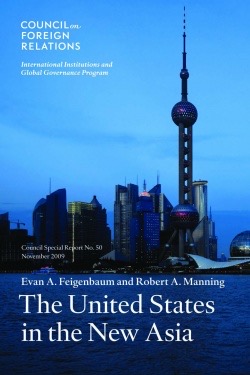1/2: The locus? Yes. An American-centric one? No. That train began leaving the station in 1997-98 and has accelerated in recent years. A restructuring is underway that will buffet US roles that prevailed post-1960s. The US is in danger of receding except as a security provider. https://twitter.com/AEIfdp/status/1275849856276484097
2/2: One huge mistake the US has made is to presume that this change is entirely a function of the rise of Chinese power rather than of structural changes that accelerated between the 1997-98 crisis and the 2008 crisis -- a critical decade in Asia. The US has adapted very poorly.
2a/2: This theme has been at the center of my writing for more than a decade. Some highlights follow ...
First, the United States has badly navigated the collision between economic integration and security fragmentation: http://www.foreignpolicy.com/articles/2012/10/30/a_tale_of_two_asias
Second, the US was late to appreciate the reintegration of historical Asia into a more organic strategic and economic space. The notion of an "Indo-Pacific" has begun to fix this but not sufficiently. And the problem predates China's Belt and Road: https://csis-website-prod.s3.amazonaws.com/s3fs-public/legacy_files/files/publication/twq11springfeigenbaum.pdf
Third, some pan-Asian institutions look certain to persist regardless of American views and preferences: http://www.foreignaffairs.com/articles/142843/evan-a-feigenbaum/the-new-asian-order
Fourth, the United States has had a tough time moving beyond "hub and spokes" approaches to the region, although real progress has definitely been made on ad hoc minilateralism since I wrote this monograph: https://www.cfr.org/report/united-states-new-asia
Fifth, the United States is so exercised about Xi Jinping's Belt and Road that it too often forgets its own pre-BRI history on connectivity and ends up behaving as if Beijing invented it and it popped out of Xi's head in 2013 like Athena from Zeus' noggin: https://macropolo.org/china-didnt-invent-asian-connectivity/
Sixth, the US too often confuses structural trends with Sinocentric ones. There's no excuse for dismissing the destabilizing effects of Chinese power but to compete the US needs to better recognize the diverse sources of its competition in the first place: https://macropolo.org/analysis/reluctant-stakeholder-why-chinas-highly-strategic-brand-of-revisionism-is-more-challenging-than-washington-thinks/
All of which is my slightly polemical way of saying that Asia today isn't the Asia of yesterday. And Asia in ten years won't be the region to which the US grew accustomed and with which it became comfortable in the decades before the changes of recent decades. Just my two cents.

 Read on Twitter
Read on Twitter



